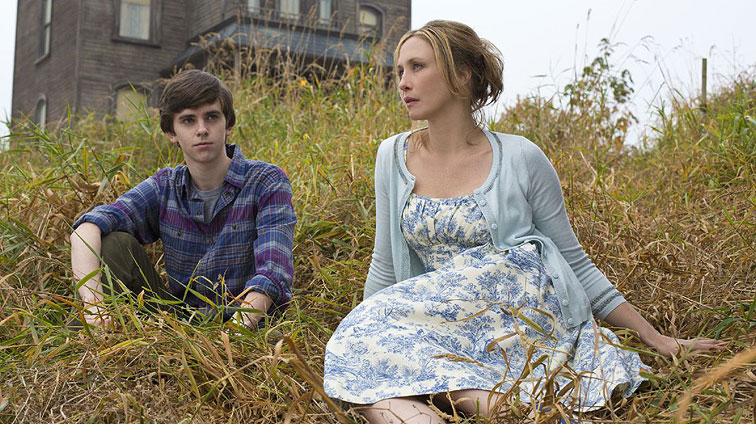
A Boy's Best Friend
Is Carlton Cuse psycho? The ex-Lost showrunner tells The Craft how he and Kerry Ehrin conceived Bates Motel, A&E's new original series prequel to the 60s Hitchcock classic, and why he likens Norman Bates and his mother to a romantic comedy couple.
 Getty Images
Carlton Cuse
Getty Images
Carlton Cuse
Television is offered around the Pony Express model where you ride the horse until it drops dead underneath you, and that's just not very satisfying as a storyteller.
When most people think of the 1960 Alfred Hitchcock-helmed thriller Psycho, they probably don't dwell on the loving relationship between shower slasher Norman Bates and his mother, primarily because Mama Norma spends the entirety of the film mummified in her son's basement.
But when Universal pitched a franchise reboot to producer Carlton Cuse, that's all he could think about. "Even though Norma Bates is dead in the movie, you imagine that she was this woman who berated her son into becoming crazy. What if we flipped that model?" ponders Carlton, who knows a thing or two about flipping models thanks to his work as executive producer of Lost. "What if they're almost like a '40s or '50s-era romantic comedy couple, and they have this incredibly loving, close relationship which is ultimately kind of doomed and tragic because that shouldn't be the central relationship in your life?"
Working from a script written several years ago by Anthony Cipriano, Carlton teamed up with veteran writer Kerry Ehrin (Parenthood, Friday Night Lights, Boston Legal) to create Bates Motel, A&E's new original series. Set in modern day northern California (sort of), it completely upends the original movie. "A lot of it was really focused on subverting the relationships," Carlton explains to the Writers Guild of America West website. "We would be retelling a story that we were never going to tell as well as Alfred Hitchcock. Why not just take these iconic characters and tell a brand new story with them?"
Whether or not the ghost of Hitchcock haunts Bates Motel, Carlton and Ehrin have created quite a creepy affair. After watching a few episodes of season one, you'll probably go back to thinking twice before taking a shower alone.
This is some uplifting source material you got saddled with.
It didn't seem interesting to me at all that we would just lavishly recreate Psycho. The show gave us license to tell a tragedy in a sense and tragedy is a fantastic storytelling form, but if you go into a network and you say, "Hey, I've got a great tragedy for you," you're not really going to get very far with that pitch. So using the Psycho franchise as the moniker allowed us to essentially sell a tragedy because we know what's going to happen to Norman Bates and we know what's going to happen to Norma Bates she's going to end up stuffed and dead, and he's going to end up killing people who show up at this motel.
What we wanted to do was tell a story in which you as an audience kind of fell in love with these two characters. In all good tragedies, you hope against hope that the inevitable doesn't happen. Titanic is a great tragedy; you are rooting for Leonardo DiCaprio and Kate Winslet even as you know that things are not going to work out well for them in the end.
You've written this with an arc that ends with mom getting stuffed in the basement and Norman going psycho in the shower?
Well, mom's going to end up stuffed, she might not be in the basement, and Norman will become increasingly overtaken by his psychological demons. So yes, inevitably we're going to get to a version of what you saw in the movie, but we're not going to be literally recreating it.
Are you planning on that happening in the lifetime of this show so that five, six years from now you'll be at that point?
Absolutely. The show has a beginning, middle and end and the end kind of connects us up with a version of the characters as we know them from the movie.
How many seasons are you planning on doing this over?
That's a good question. It's a little too early to say. We are still working on figuring out the paradigm of the series, and that we'll know better over the course of the next season how many seasons of storytelling we have.
It's like it was with Lost. It was really important, maybe the most important part of our journey as storytellers when Damon Lindelof and I got the network to agree to an end date. Because it was a story, these people crash-landed on an island and you wanted to find out what their ultimate fate was. In the same way, Bates Motel is a story that has an end point. We know what that end point is, and we, as an audience, want the story to be moving towards that end point. But Ehrin and I haven't really figured out yet exactly how many episodes it's going to take us to get here.
That must be more empowering than knowing that some year the network's going to say, "Sorry, we're not renewing you," and then you have to wrap things up.
Yeah. I think that what happened on Lost influenced Vince Gilligan to end Breaking Bad and Matt Weiner publicly announced that Mad Men will come to an end. That's what it should be. Television is offered around the Pony Express model where you ride the horse until it drops dead underneath you, and that's just not very satisfying as a storyteller. Watch a show like ER, which was the biggest juggernaut in television for its first five years, and it was just a phenomenal show and yet it ended in somewhat muted fashion. I feel like it's a wonderful opportunity as a storyteller and as a showrunner to be able to end the show while people still care about it.
Do you think that your target audience is even aware of Psycho except for the scary REE-REE-REE stabbing soundtrack?
A&E did some testing on this. People over 25 tend to be aware of the movie; people under 25 do not. That's part of the reason why we didn't feel that we were slavishly married to the original movie. I hope that the cornerstone of the show is that you can watch it without having seen the movie. It's still a completely engaging and self-sustaining story without any knowledge of the feature. The movie is one of the best movies ever made, but that shouldn't be looming there as a critical piece of you being able to enjoy this TV show.
Christopher Nolan's Batman series pops into my head. You don't need to be a comic book nerd in order to enjoy those.
I'm glad you said that because Christopher Nolan was a huge inspiration for me. I felt like he took a franchise that had a bunch of other iterations and made it wholly his own. He took some of the iconic elements of that franchise, Batman, the Batsuit, the Batmobile, and some of the surrounding characters and he used them to tell a story that was completely his. I feel like that's what Kerry Ehrin and I have set up to do in this show.
But at the same time will Hitchcock influence? Is he stuffed in the bottom of your creative basement?
Just having grown up on watching his movies and feeling like he was really one of the true masters of cinema definitely are influences in the show, particularly his ability to create and sustain suspense in ways that feel incredibly organic. We definitely borrowed from him. We definitely borrowed certain stylistic elements from the movie and from the totality of his movies, but we didn't subconsciously attempt to recreate his shooting style. I felt that the iconography of the original movie was important in the same way Chris Nolan kept the Batmobile, kept the Batsuit. He didn't have Batman wearing something wholly different, he made his own version of it. We kept the house and the motel. We rebuilt them on a hillside south of Vancouver using the original plans that Hitchcock drew up for the movie. I guess that's the closest direct connection to the movie, the visual landscape, but then we sort of took our own path from there.
How did you settle into the whole faux-retro thing?
We felt that Norma and Norman had a timeless relationship. We almost saw them as Tracy and Hepburn or any kind of classic, old movie pairing. They exist in this timeless sphere apart from the rest of the world. Then Tucker Gates, our director responded to the timeless quality in the script and expanded out some of the stylistic choices in the direction of the pilot. You almost feel in the beginning like it is a period movie until suddenly Norman's sitting at the bus stop and the girl pulled out his iPod, and he's wearing earbuds. And you go, "Oh, this is actually contemporary."
How do you balance the sympathetic and creepy nature of these characters? This is, after all, Norman Bates.
With the characters we were striving to make them as sympathetic as possible and then overlay a narrative that forces them to make some bad choices. It's interesting to take characters that you like and care about and then put them in a situation where they make a poorly reasoned choice, and that just sort of waterfalls upon itself in ways that create further and further complications for the character.
So, as a storyteller, you try to make a character likeable, sympathetic, but flawed. Then you create a situation where the character makes a decision that ends up having profound consequences. Then you get to have all the fun of writing the juicy scenes that come about as a result of that poorly reasoned decision.
I thought that you did a pretty good job of that. Even though I've seen Psycho 20,000 times, I'm still rooting for Norman Bates.
One of the things that struck me is that you like Norman Bates in the movie. When Arbogast shows up at the end of the movie, we're, as an audience, rooting for Norman not to give himself up or say the wrong things to the detective. Hitchcock successfully subverted so many of our expectations in that movie. First, you kill the heroine of the movie at the first act break, and then you find yourself actually liking and caring about Norman Bates. We're not sure who killed her in the shower, was it him, or was it his mom?
You're not going to do that, right? Norma Bates isn't going to die in episode three, right?
I won't make any promises. Let's just say if you have Vera Farmiga playing Norma Bates, you'd be pretty stupid to kill her too soon.
Maybe that's what people were telling Alfred Hitchcock about Janet Leigh.
True.
© 2013 Writers Guild of America West
